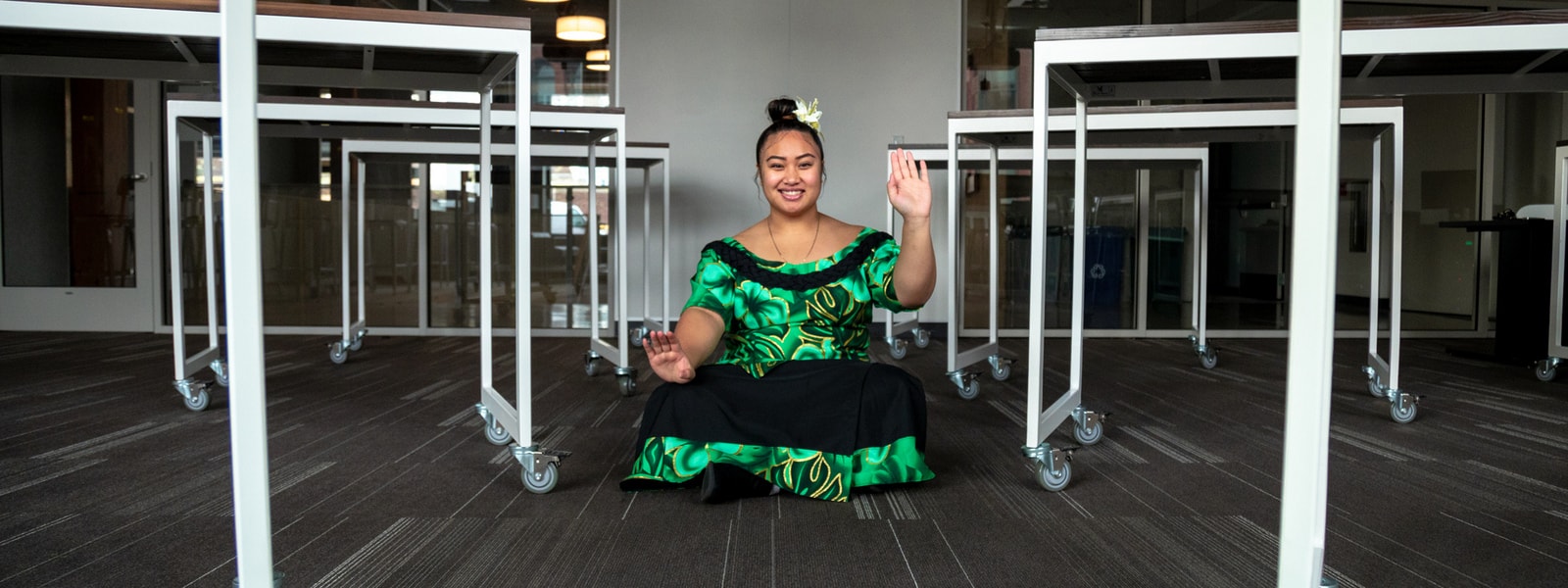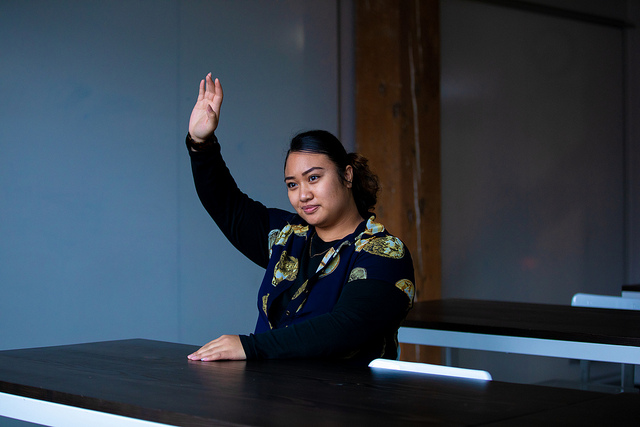
Creating a Campus Family
UW Tacoma alumna Nedralani Mailo, '17, found her voice in the classroom and is using it to help students, including fellow Pacific Islanders.
(Nedralani Mailo provided the following information about her pose in the photo above: "Sitting on the floor is a sign of respect in the Samoan culture. I am wearing a traditional puletasi for women and a sei in my hair to represent my Samoan roots, while performing a common hand movement found in traditional dances.")
The classroom is desks and whiteboards, computers and pens, teachers and students. Remove the obvious, and a classroom is so much more. “I always go back to the classroom because that’s where I was encouraged to share my stories and not be apologetic about it,” said the Center for Equity and Inclusion’s Program Support Supervisor Nedralani Mailo.
Mailo graduated from UW Tacoma in 2017 with a degree in healthcare leadership. Her interest in the healthcare profession stems from an experience she had during high school. “Senior year, my dad was in the hospital and he almost didn’t make it,” said Mailo. “Just being there with him made me realize I wanted to do something where I could help.”

Mailo’s educational journey slowly took her away from healthcare. “I took Tanya Velasquez’s introduction to Asian-American studies course and that really opened the door for me to have conversations about how we show up in the world and showed me the importance of having a voice when it comes to my history and my people,” said Mailo.
A first-generation college student, Mailo says she initially didn’t feel comfortable on campus. “I didn’t have the courage to speak up and share my thoughts because I felt I didn’t belong.” The transition into higher education became easier once Mailo joined the Asian Pacific Islander Student Union (APISU). “I found my sisters here,” she said. “The relationships I made through that organization are ones I cherish to this day.”
“APISU provided me with a platform where I can embrace my culture and my values and educate others on what it means to be a Pacific Islander in higher education."
Family is important to Mailo and even impacted her choice of colleges. “I went to Wilson High School and wanted to stay close to home,” she said. Mailo’s parents were both born in Samoa. Their families knew of each other but the pair didn’t meet until later when they both lived in California.
Mailo has three younger siblings—all brothers. “I’m kind of like the second parent to them,” she said. “I definitely feel a sense of responsibility to them and to a lot of my cousins.” Mailo’s dedication extends to the larger Samoan community. “Finishing college was a huge milestone, not just for me, not just for my family, but for my community,” she said. “I hope to help pave the way for future generations. One of my biggest goals is to see more Pacific Islander people in college.”
Mailo’s work with the Center for Equity and Inclusion (CEI) is an extension of her family-centered philosophy. She supports student programming produced by the CEI. “We really encourage our student workers to be the storytellers of these events and programs,” she said. “The Umoja Celebration came from allowing students to be the voice of what they would like to see. These students have so much knowledge and wisdom to share, they just need an outlet to do so.”
Part of Mailo’s responsibilities include managing The Pantry. “We really hope to change the conversation around what food insecurity means to students,” she said. “How does this impact students not only in the classroom but also at home?”
Mailo’s work with the CEI brings together the potential of a classroom with the warmth of a family. “We want students to see us as a hub on campus where anyone can come and visit,” she said. “It’s important for students to come here and claim this space as a home away from home.” Mailo is still interested in healthcare and may ultimately decide to pursue a career in that field, but even if she doesn’t she’s already making a difference.



